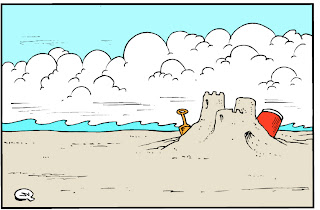
In the waning days of summer, Travelsmith, a purveyor of clothing and accoutrements for travelers, posted a question on Facebook that started me thinking—“Are there picturesque coastal views that bring back memories of childhood?”
The site asked for photos as well as responses, and there were some lovely shots. What troubled me is that the coastal views of my childhood in most cases no longer exist. I remember the coast of the Gulf of Mexico in Alabama and the Florida panhandle when it truly was the Redneck Riviera. There were no high-rise hotels and no one would have known what a condominium was (in fact, they would have forbidden the word’s use in front of children).
A trip to the beach meant a sojourn in an exceedingly modest motel, heading to the beach with just a towel—for sitting as well as drying—and showering off in a cinderblock bath house. It was beautiful.
There are stretches of beach in state parks that still approximate the views of my childhood, but elsewhere they have been obliterated. While I find this sad in some ways, at least I have found a word that describes the feeling of loss—“solastalgia.”
This neologism was coined by an Australian philosopher to describe the distress or melancholy caused by change in one’s local environment, such as when farms turn into suburban real estate developments. Nice as those new houses may be, part of me misses the ramshackle farm buildings and rows of crops.
The term has been popularized—maybe that’s too strong, so let’s say adopted—by environmentalists to describe their general distress about generally everything. But I am wondering if I could stretch its meaning to describe a feeling I often have—a tinge of melancholy that I can’t visit the places I have loved through books or movies. I don’t mean fictional places, although we might need a word for that, too. I mean real places. Just not as they are now.
I would love to visit the Mayfair that was so familiar to Bertie Wooster. I would love to see Bath and Lyme Regis as seen by Anne Elliott, or the Lake District that inspired Wordsworth. Oh, to see Hawaii as Mark Twain saw it in 1866, or O. Henry’s turn-of-the-century New York. Even visiting places in my own time would be nice—I would love to see my hometown in the 1950s and early 1960s through adult eyes, and whenever I watch a favorite little movie, “The Dish,” I yearn to be in Australia in 1969.
Of course, all these places would be wonderful to visit even now. But there is that tinge of loss. Certainly I would leap at a chance to travel to Australia, but the knowledge that now there are philosophers Down Under makes me solastalgic.
